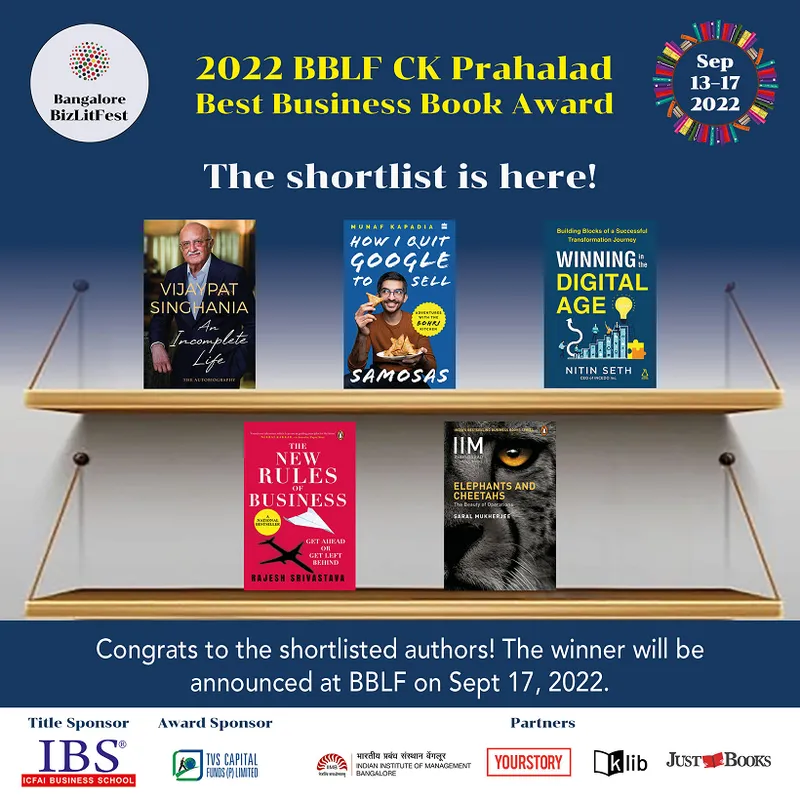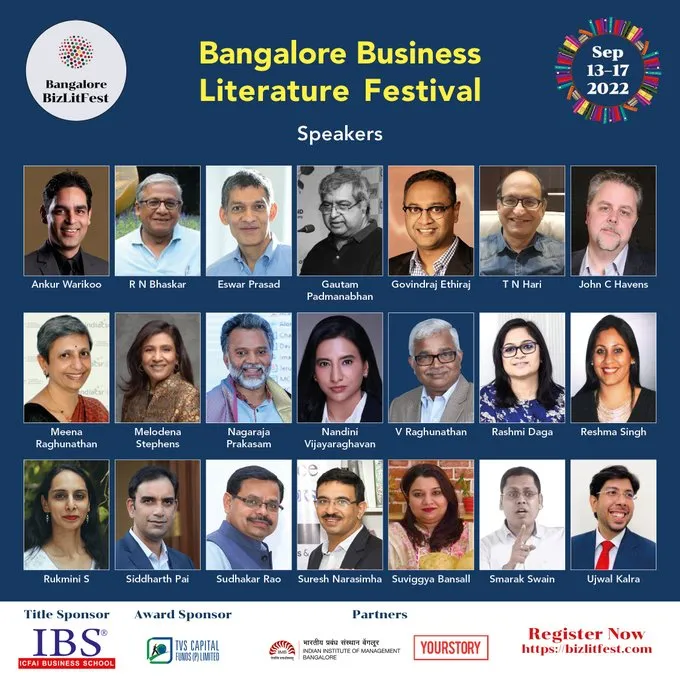Reframe, redraw, reinvent: Success tips and insights from Rajesh Srivastava, author, ‘The New Rules of Business’
Creativity, innovation, and entrepreneurial drive are key to success in this era, according to this business veteran, author, and educator.
Business veteran, educator, and writer Rajesh Srivastava is an alumnus of IIT Kanpur and IIM Bangalore. He spent over three decades as a manager in sectors like beverages, food, commodities, personal care, and education. He is the author of The New Rules of Business: Get Ahead or Get Left Behind.
The book has been shortlisted in the Top 5 by the Bangalore Business Literature Festival (BBLF) for the 2022 BBLF CK Prahalad Prize. As the litfest media partner, see our earlier articles on BBLF from the 2015 edition onwards here, and our compilation of 85 Quotes on World Book Day.
Rajesh was president of JK Helene Curtis Ltd (a Raymond Group company), adjunct faculty at IIM Indore, and COO of SP Jain School of Global Management. He is a prolific writer and sought-after business consultant.
See also YourStory’s Book Review section with takeaways from over 340 titles on creativity, entrepreneurship, innovation, social enterprise, and digital transformation.
Rajesh Srivastava joins us in this interview on the new roles of business partners and customers, pandemic resilience, creativity tips, and business growth.
Edited excerpts below:

YourStory (YS): How can businesses rope in customers as partners in co-innovation and co-creation? Any examples you can cite in this regard?
Rajesh Srivastava (RS): One universal motivation which drives customers to co-innovation and co-creation is compensation.
Take the iPhone, for example. Can you imagine your iPhone without the apps? To me it would mean defanging it—with the apps, I can do so much more. Who makes these apps? Apple invites the developers (read: partners), and provides them with resources which are designed to help them create it.
The developers keep 70% of the revenue while Apple gets to keep the balance. Apple estimates that $100 billion was paid to developers over a decade. The balance is kept by Apple. Apple helps the developers (read: partners) in co-creating.
Heineken, too, has leveraged this insight to motivate its customers to innovatively solve a business challenge it was facing—to make its packaging more sustainable. A financial reward of $10,000 awaited the winner. The winner proposed a device—Heineken-o-meter— which transformed recycling into a game. People who took the trouble of returning the bottle stood a chance to win $1000.
You too can inspire your customers to engage as co-creators and co-innovators and seek their expertise to grow revenue, achieve business goals or in solving business by offering them compensation.

YS: What new rules of business would you suggest for better ecosystem partnerships?
RS: The new rules of business for ensuring better ecosystem partnership include shifting away from the transactional way of doing business and moving towards building deep relationships with every stakeholder of the ecosystem.
Every partner and stakeholder should have their “skin in the game”. This can happen when they own the business–no matter how small a stake they own.
YS: How can businesses effectively harness CSR as a way to build a better brand?
RS: Business can effectively harness CSR by making it an integral part of their business strategy, as Tesla has done. It has made ‘sustainability’ an integral part of its business strategy by offering ‘clean’ transportation.
YS: How was your book received? What were some of the responses you got?
RS: My book has received a positive response since it was pre-launched. Over time its acceptance has grown among bibliophiles. Here are some ratings on Amazon (4.7 / 5, from 306 global ratings and reviews), Flipkart (4.7 / 5, from 95 ratings and reviews), and Goodreads (4.22 / 5, from 59 ratings and 17 reviews).
Here are some reader comments: “Very good book, enjoyed reading it. Examples are simple and easy to understand and from the Indian business context which is relatable considering the diverse set of issues that exist in the Indian business segments.” “Must read if you want to update your business knowledge.”

YS: How do you continue to engage with audiences after publication?
RS: I followed a three-pronged strategy to engage with community members. Almost every day, I would pick a trending business topic and relate it to one of the ‘rule/s’ mentioned in my book. This strategy ensures that my content on social media (such as LinkedIn) was always fresh and trending.
Every fortnight, I would also do a webinar for business schools and other educational institutes and industry bodies, in which I spoke about the book. Finally, I would reproduce excerpts from the book on occasion.
YS: Perhaps the pandemic requires a new section in your book on crisis management! What would your recommendations be for businesses with respect to pandemic resilience?
RS: Crisis management is as old as the hill and has been an integral part of business. So, it does not deserve a new section.
But the pandemic got employees to ‘work from home’ (WFH) which entailed that they had to work with minimal supervision. Unlike the earlier times when they had to carry out our instructions, now they had to ‘think, reflect and act’. Many employees found themselves at sea.
Now, as the pandemic wanes, WFH is becoming the new normal. Therefore, organisations must make sure that their employees are proficient in ‘thinking, reflecting and acting’. This requires them to acquire proficiencies in 10 skills.
The skills are creativity, innovation, critical thinking, framing the right question, smart problem solving, lifelong learning, storytelling, influence without authority, humanness, and entrepreneurial spirit.
Once employees become proficient in them, then they can be counted upon to ‘work from anywhere’.
My second book, The 10 New Life-Changing Skills: Get Them and Get Ahead, published by Penguin Random House, covers these 10 skills.

YS: What are the best ways to engage with business leaders for mentoring and coaching?
RS: A good example is ‘Shadow the Leader’. In it, a youngster is attached to a senior member of the company with the mandate of shadowing him/her.
This provides an opportunity for the youngster to learn from observing how the leader makes decisions, engages with people, and generally conducts themselves. The youngster seeks to memorise and then exhibit these behaviours, or versions of them.
This strategy ensures that the work ethics and learnings of the seniors are transferred to the juniors and in the process, the leaders vicariously become a mentor or coach.
YS: Value or valuation, growth or profitability-these are questions that often challenge businesses. What's the best way to address these tradeoffs?
RS: An organisation which focuses on creating ‘value’ witnesses soaring valuation. Also, it would be misleading to say that a business has to choose between growth and profitability. In my opinion, an organisation should pursue “profitable growth”.
The best way to pursue value creation and profitable growth is to follow the Rules of Three, covered in my book:
Rule 1: Focus on creating a better product, not a cheaper product
Rule 2: Focus on revenue, not cost
Rule 3: There is no third rule.

YS: How should leaders and managers deal with situations where a product, launch or campaign has failed?
RS: We launched a premium whisky in the 750 ml pack size. This decision was based on hard data that in the premium segment, the 750 ml pack size sold the most. But the market gave the new brand a lukewarm response.
Research conducted to understand the cause of the lukewarm response indicated that premium whisky drinkers indeed preferred the 750 ml pack size, but of their favourite brand. They did not wish to take the risk with a new brand and preferred to buy a smaller pack size—375 ml or 180 ml.
Upon trial, if the new whisky was found to be good, then they bought the larger pack size. This failure taught me an important lesson: data should not be used blindly. Failure offers opportunities to learn, which success does not!
YS: How can social entrepreneurs and non-profit organisations make use of your frameworks?
RS: Social entrepreneurs and non-profit organisations need to be run like a professional organisation with one exception.
These should not be burdened with the responsibility of making profit. Therefore, every rule that is applicable for profit organisations, is equally applicable to non-profit organisations.

YS: What are some ways in which people can awaken their inner creativity, and then move down the path to entrepreneurship?
RS: Here is a partial list of creativity enablers:
• Be curious
• Be observant
• Be in a positive and non-threatening environment
• Broaden your experiences
• Self-impose modest constraint
• Have the freedom to experiment and fail
• Carve out “me” time for yourself, where you are with yourself.
Being creative will help you come up with a big idea, just as Henry Ford came up with the idea of the assembly line for car production which revolutionised car manufacturing or Steve Jobs came up with the idea of the smartphone, which has enriched our lives.
YS: Is there a perfect or right age for entrepreneurship?
RS: There is no perfect age for entrepreneurship. But technology entrepreneurs tend to be of a younger profile, while industrial age entrepreneurs tend to be of an older profile.
Here are the ages of people when they started their entrepreneurial journeys: Bill Gates (16 years), Steve Jobs (21 years), Jeff Bezos (31), Ritesh Agarwal (22), Mark Zuckerberg (19), Larry Page and Sergey Brin (25), Jack Dorsey (23), Elon Musk (24), Colonel Sanders (65), and Ray Kroc (52).

YS: What are some books on your reading list these days?
RS:
Range – How Generalists Triumph in a Specialised World by David Epstein
Principles by Ray Dalio
The Ascent of Money – A Financial History of the World by Niall Ferguson.
YS: What are your words of advice or tips for the aspiring founders and leaders in our audience?
RS: You can achieve remarkable results if you are not bothered about who gets the credit. Do not start a business with the intent of exiting. Do not buy sales.
Be frugal when you get funding-refrain from creating expensive overheads. Never hire people with the hope that business will follow-most often it does not, and then you have to lay them off.
Have your skin in the game. Do not blindly copy somebody’s successful formula. Do not chase vanity metrics. Always be open to receiving feedback.
Be in a state of perpetual beta. Do not be afraid to say “I do not know”. Be kind, not clever. Learn from mistakes, they are the best teachers.

YS: Any other parting comments or remarks?
RS: I am often asked–who did I write this book for?
My answer is: I wrote it for myself, believing that if I fall in love with the content of my book then there will be enough people with my sensibilities who too will fall in love with it. My judgement has proved to be right!
Edited by Megha Reddy



![[Year in Review 2021] Top ten changemakers of the year](https://images.yourstory.com/cs/5/79900dd0d91311e8a16045a90309d734/collage1-1639488579193.png?fm=png&auto=format&h=100&w=100&crop=entropy&fit=crop)
![[Year in Review 2021] Amid COVID-19, these 10 non-profits created social impact this year](https://images.yourstory.com/cs/5/79900dd0d91311e8a16045a90309d734/collage-1640102486726.png?fm=png&auto=format&h=100&w=100&crop=entropy&fit=crop)
![[Year in Review 2021] Meet the top 10 techies we celebrated this year](https://images.yourstory.com/cs/2/b87effd06a6611e9ad333f8a4777438f/collage4-1639196680900.png?fm=png&auto=format&h=100&w=100&crop=entropy&fit=crop)
![[Year in Review 2021] Times are changing as women in tech reach new heights](https://images.yourstory.com/cs/4/bf6cd6001f6d11ec9f7c8d775ba8e1d7/women-tech-leader-1640501582312.png?fm=png&auto=format&h=100&w=100&crop=entropy&fit=crop)
![[Year in Review 2021] How women entrepreneurs pivoted during the pandemic and saw tangible results](https://images.yourstory.com/cs/4/8e7cc4102d6c11e9aa979329348d4c3e/Cover-05-1639653048479.png?fm=png&auto=format&h=100&w=100&crop=entropy&fit=crop)
![[Year in Review] Meet these Indian women who used social media to drive change and social impact](https://images.yourstory.com/cs/4/211ccaf00e6d11e997fe8f165dce9bb1/NewDesigncopy14-1640700625660.png?fm=png&auto=format&h=100&w=100&crop=entropy&fit=crop)




